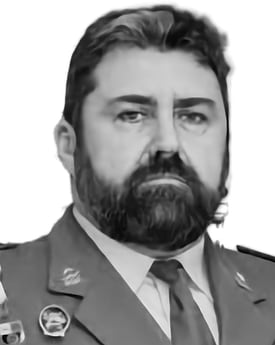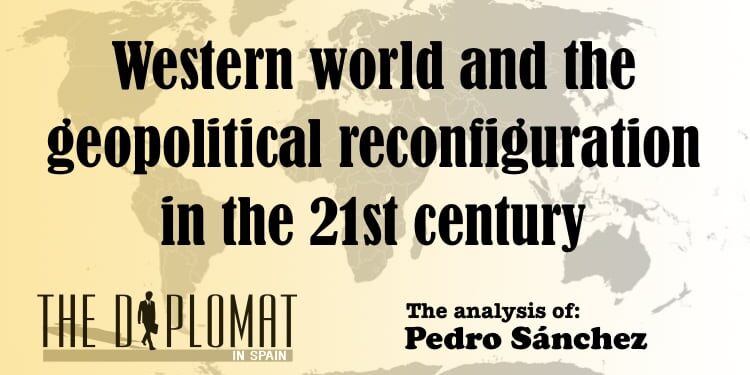In a planet in the midst of geopolitical reconfiguration, not only are the powers – old and new – struggling to establish a new order of global power, but also the societies of the world’s nations are subject to complex dynamics. Profound changes – such as technological ones -, doubts about the future and growing uncertainties generate a panorama of unease and despair that encourages a lack of faith in democracy and the ‘Western model’, not only in most parts of the world but even in the West itself.
Colonel Pedro Sánchez Herráez / IEEE
Polarisation, disunity, lack of faith in institutions and governments, and the search for ‘strongmen’ are becoming constants even in hitherto stable and apparently almost exemplary societies. And nations around the world, especially in Africa and the Sahel, are increasingly disavowing both the rationale and the works of the West – even without a clear alternative model.
If things are complex in rich nations, in the rest of the world the narrative is twofold: The West always plays with a ‘double standard’. This double standard currently has two main points of reference in relation to the actions and declarations – deeds and reasons – put forward in relation to the conflict in Ukraine and Gaza, because although they can be interpreted from very different polemological and argumentative causes, a host of similarities can also be established. Thus, the so-called Global South – essentially the southern hemisphere and non-Western countries – accuses the United States of double standards in Ukraine and Gaza – indeed, the term sometimes used is ‘hypocrisy’.
And all of this, logically, undermines that real or supposed leadership in championing human rights and democracy, within that narrative of efforts towards a better world, when much of the world – indeed, most of the world – is imbued with ‘the perception of double standards and frustration that other issues do not receive the same sense of urgency and massive resources that have been mobilised for Ukraine’.The perennial Western double standard is constantly pointed out: ‘bad deeds’ versus ‘good reasons’. Thus, it is also brought up that in the face of years of eagerness by several nations to join the European Union (EU), it is argued that Ukraine applied for EU membership on 28 February 2022 – only four days after the invasion by Russian troops – and was granted candidate status in June 2022, despite the huge costs that inclusion would entail, and not forgetting that ‘Ukraine is still too corrupt to join the West’. In contrast to this apparent rush, Turkey is ‘tired’ of the eternal EU accession process, having waited for decades, as although Ankara was granted candidate status in late 1999, issues such as fundamental rights, rule of law and democracy led to negotiations reaching an impasse in June 2018.
Certainly, the application of this ‘double standard’ that has sometimes been practised, among other nations, by the United States – it suffices to bring up again the divergence of actions and reasons carried out and put forward in the cases of Ukraine and Gaza – also has the collateral effect of denigrating and disqualifying the sincere efforts made for decades, serves to provide arguments to attack US and Western ‘soft power’ as a whole and to motivate the loss of support and allies in Africa and other parts of the planet…. spaces that are quickly exploited by China and Russia – among others – with a completely different approach to supporting the governments of nations that request it than that provided by the West, and which support and encourage this ‘anti-Western narrative’.
And this is being exploited by new powers with anti-imperialist narratives, without placing conditions – apparent or direct – on the requests made and showing, also apparently, no desire to interfere in the internal affairs – or what is sometimes interpreted as such – of these nations. And that is why they are displacing the West, or simply being called upon as an alternative by these nations, in many areas. And one of them, crucial because it constitutes Europe’s southern border, is the Sahel, the wide strip of land south of the Sahara and a key area of continental mobility.
In this area, especially in the western Sahel and centred on Mali, Burkina Faso and Niger, the West has been largely expelled from these three nations, which have created a confederation that seeks to expand as a certain element of ‘pan-African resurgence’ in the face of – real or supposed – Western impositions and norms.
These governments have adopted a sovereigntist, anti-French and anti-Western discourse, which aligns perfectly with Putin’s ideology – with Putin’s reasons – and democracy is accused of being ‘an externally imposed system, unsuited to African traditions or ineffective’.
Thus, expressions such as ‘getting out of subordination’, moving away from the West and ‘marching towards sovereignty’ are a constant; and it is even pointed out that human rights should not be instrumentalised or politicised, and that ‘countries that practised slavery or colonisation are today lecturing others on human rights’; And, along these lines, the Burkinabe president noted that he rejects loans from the International Monetary Fund, a growing action in Africa, citing ‘financial sovereignty’ as a new aspect to recover vis-à-vis Western institutions, enhancing economic independence from external pressures and aid, and thus avoiding a sort of eternal debt trap. Even the term ‘financial slaves’ comes up in social media posts by Burkina Faso government officials… the disaffection with the West, and ‘its reasons’, is growing.
The request for arms, as well as other types of support, but above all arms to fight terrorism, had been a constant request from the Sahelian states, a request that had been systematically denied by the EU and other Western countries, to the anger and disenchantment of the African authorities, who, given the reasons that the West put forward for not providing them with arms that could help them fight terrorism, pointed out that there were not so many safeguards for granting them to Ukraine. In fact, the Spanish Chief of Defence Staff (JEMAD) himself recently pointed out that ‘the countries of the Sahel not only need training, but also weapons’, and that this is perhaps the most important reason why, feeling threatened and not receiving a timely response (from the West), they have turned to Russia.
And the fact is that – although these Sahelian nations continue to be the epicentre of regional and global terrorism – Burkina Faso, for example, has regained 29% of its territory from the jihadists; whereas in 2022 the terrorists controlled 61% of the country, today it is ‘only’ 31%. In addition to the tactics and strategy employed by the ruling military junta, as well as the growing support of the countries of the Sahel Alliance, the purchase of arms and the support of Russia seem to have been key in reinforcing Burkinabe capabilities… a nation that also raises the question of how territory is now being recovered and how this was not possible during the time of deployment – a decade – of thousands of French army troops on anti-terrorist missions. It seems, therefore, that the attachment to the West’s ‘reasons’ does not exist, or is disappearing… and to its ‘works’?
In a combat action in northern Mali at the end of July 2024, Tuareg rebels and jihadist terrorists inflicted heavy punishment on a column made up of personnel from the Russian contractor company Wagner and soldiers from the Malian army, with an estimated death toll of around a hundred contractors and almost half a hundred soldiers. With regard to this action, which was a hard blow for Mali – and for Russia/Wagner – the Ukrainian authorities claimed to have supported the action,46 although the different communiqués issued by different authorities and on different channels were later denied. The perception in Sahelian lands is that, in this global reconfiguration, the war unleashed on Europe’s eastern border apparently creates a new front of open fighting on the southern border… and the West – through Ukraine, which is fighting to be part of it – has supported the death of Malian soldiers.
The reactions are swift and forceful, given the capacities of these Sahelian nations, the poorest of the poor on Earth: Mali breaks off relations with Ukraine, as does Niger. And even ECOWAS (Economic Confederation of West African States) itself, which they resigned from – and accuse of being a tool of the West – Mali, Niger and Burkina Faso have all shown ‘their strong disapproval and strong condemnation of any foreign interference in the region that may constitute a threat to peace and security in West Africa, as well as any attempt to provoke violence in the region in the current geopolitical confrontations’.
The growing narrative in much of the world – and not only in the Sahel – is that the West preaches values and economic prosperity while profiting from a colonised world, so that not only Western hegemony, but even appreciation of the West, however mythologised, must end. And that is why, from certain quarters, it is stated unequivocally: ‘The future is post-Western. This current chapter in human history led by the West must be closed at a stroke’. Will this be the case?
Whether it will or not is certainly a matter for all of us. Everyone’s. The real non-existence of an alternative model prevents the existence of a real dilemma, although the global dynamic sows powerful uncertainties in people and nations, in human groups and countries… and even casts doubt on issues, on reasons – rights, freedoms… – that were taken for granted as a human heritage, as a global heritage.
If where the model was born, if where it was achieved – with much effort and sweat – to adequately align ‘good reasons and good deeds’, it is questioned, perhaps a profound reflection is necessary. Perhaps, and only then, can its strength and vigour be recovered.
And if, in addition, we are aware that the planet moves at different speeds and rhythms, that needs are at different stages and that meeting them and helping to cover them must be done in a very careful and consensual manner, and being absolutely clear that a centuries-long path cannot be covered in a few years or decades, there is certainly hope that good reasons and good works will spread, once again and increasingly, across the planet, and that the model will be accepted, with the necessary nuances, on a global scale. Perhaps it would be necessary to remember and recover the need to ‘act’, and to do it all together, rather than to ‘philosophise’ and each one on his or her own. Certainly, it is not easy, it is not cheap and it is not without effort and sacrifice. But without a doubt, by believing and working, it is possible. This could be one of the great works of the 21st century? The alternative…
© This is a summary of the analysis published by the Spanish Institute for Strategic Studies. You can access the full version through this link.

Pedro Sánchez Herráez
Colonel of Infantry DEM / PhD in Peace and International Security / IEEE Analyst
He served in the Legion for 15 years, with which he participated in international missions in Bosnia-Herzegovina, Albania and Kosovo. He holds a PhD in Peace and International Security and is an analyst at the Spanish Institute for Strategic Studies (IEEE) where he publishes on the Maghreb and the Sahel, among others.
He is a lecturer at the Army War College and the ‘General Gutiérrez Mellado’ University Institute. He is an associate professor at the Complutense University of Madrid and collaborates with several universities, centres and institutions.







